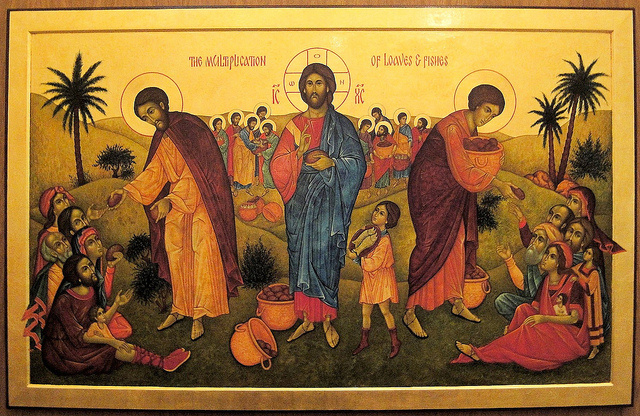Jesus said to them, “I am the bread of life; whoever comes to me will never hunger, and whoever believes in me will never thirst.”
Jn 6:24-35
Last Sunday we switched from the Gospel of
Mark (the Gospel for Year B) to the Gospel of John Chapter 6. We continue today
the reading from John Chapter 6.
The people look for Jesus in Capernaum.
Jesus frankly tells them that they were looking for him NOT because they
understood the meaning of the multiplication of the bread but because they
wanted to see another miracle or they wanted to get free bread again. Jesus
uses the opportunity to teach them. “Do not work for bread that perishes
(naluluma at inaamag). Instead work for food that does not go stale (di
naluluma, di inaamag) and that can give you eternal life. This I, the Son of
Man, can give you.”
They reply, ““What can we do to accomplish
the works of God?” What they mean is: “How can we get our hands on this special
bread you are talking about?”
Jesus answers, “This is the work of God,
that you believe in the one he sent.” Believing in Jesus does not only mean
accepting what Jesus says as true. It means taking the side of Jesus. In the present INC crisis, to believe in Ka Tenny and Ka Angel means to take their side
against the Sanggunian of the INC. And that was what the INC minister in California did.
The people respond: “What sign can you do,
that we may see and believe in you? Our ancestors ate manna in the desert.” If
I were Jesus, I would say, “Hello! And what do you think I did on the other
side of the Lake. Did I not perform a sign? Did I not feed more than 5,000
people with bread and fish?” Instead, Jesus corrects them by saying that it was
not Moses who gave them manna but his Father in heaven. He makes a second
correction. That manna is only a symbol of the bread that his Father is going
to give to them today.
When the people said: “Give us this bread
always”, they wanted Jesus to be their supplier of this special bread that does
not go stale. They were still thinking of earthly, physical bread!
Finally, Jesus makes the final correction to
their mistaken belief by declaring that the bread he was talking about all
along was he himself. “I am the bread of life.” And therefore, to eat the bread of life is
to have faith in Jesus, to take the side of Jesus (isugal ang buhay at
kapalaran sa pagpili kay Jesus).
And by doing so, one receives life from Jesus.



